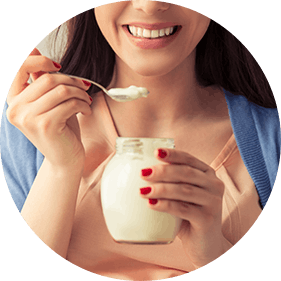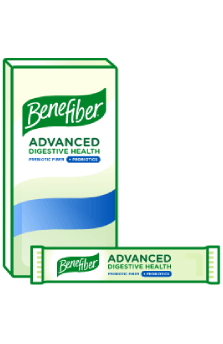What’s in Your Gut — and What It Means for Your Health
Learn how probiotics and prebiotics affect your health.


Your digestive system is home to trillions of bacteria—10 times the number of your human cells.1 But don't let this alarm you. While some bacteria cause problems, the bad guys in your gut are largely outnumbered by colonies of friendly bacteria, or resident flora. Keeping your gut flora happy translates to both good digestive health and contributes to overall well-being.
Gut Flora and Digestion
The human gastrointestinal tract contains around 1,000 bacterial species.2 Your friendly gut bacteria have a lot of work to do to maintain your health. They help you digest food and metabolize nutrients.
The composition of each individual's "microbiota" is unique, influenced by factors like diet and geography, but some microbes are common to all of us.
Implications for Health
A lot of factors can influence the vitality of your gut flora. Stress, age, poor diet, and environmental circumstances can disrupt your healthy microbes.
Treatment with antibiotics kills off good bacteria as well as bad, and may result in antibiotic-related diarrhea. Repeated antibiotic use can wreak havoc with your gut flora's ability to fight off common bacterial infections, like Salmonella food poisoning, and even more dangerous ones like C. difficile.
A weakened microbiota may manifest first in digestive issues, like constipation and diarrhea, but not all symptoms are digestive. Emerging research shows that some scientists suggest a person's specific microbiota may also determine obesity.3
Probiotics for Gut Health
So how do you keep your gut flora happy and healthy? Probiotics (from the words "for" and "life") are beneficial live microorganisms that act like the healthy bacteria in your gut.
Eating foods that contain probiotics or taking probiotic supplements can help your gut flora repopulate so they can fend off pathogens.
Some of the best sources of probiotics include yogurt, buttermilk, miso, tempeh, fermented milk, and soy beverages. You can also find other kinds of food that may contain probiotics, like cereal, sour cream, and cottage cheese.4
If probiotic foods are unappealing, you could also use supplements. But because different health conditions respond to different strains of microorganisms, consult a nutritionist or doctor about which one would be best for you.
The Role of Prebiotics
Although they sound similar to probiotics, prebiotics have different origins, functions, and dietary sources.
Prebiotics are, generally, carbohydrates that are not digested in the body. Prebiotics resist digestion, traveling intact to the colon where they ferment and feed the healthy microflora. For example, all Benefiber products are prebiotic fiber.
Prebiotics and probiotics work side by side to help maintain a healthy microbiota. Talk to a doctor or nutritionist about the potential benefits for a specific condition or for your overall well-being.
*These statements have not been evaluated by the Food and Drug Administration. These products are not intended to diagnose, treat, cure or prevent any disease.
Use as directed.
- Bush, Larry M., and Charles E. Schmidt. "Overview of Bacteria." Merck Manual Consumer Version. Web. http://www.merckmanuals.com/home/infections/bacterial-infections/overview-of-bacteria.
- Guinane, Caitriona M., and Paul D. Cotter. "Role of the Gut Microbiota in Health and Chronic Gastrointestinal Disease: Understanding a Hidden Metabolic Organ." Therapeutic Advances in Gastroenterology. SAGE Publications, July 2013. Web. https://www.ncbi.nlm.nih.gov/pmc/articles/PMC3667473/.
- The Human Microbiome. Web. http://learn.genetics.utah.edu/content/microbiome/disease/#obesity.
- "The Benefits of Probiotics." Harvard Health Publications. Harvard Medical School, 2014. Web. http://www.health.harvard.edu/alternative-and-complementary-medicine/the-benefits-of-probiotics.
Nourish the Goodness Inside
Benefiber is an easy way to add fiber to your life.
$1.50 OFF BENEFIBER







